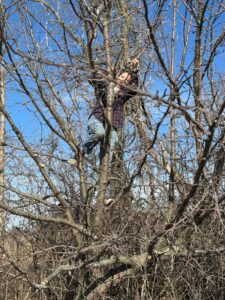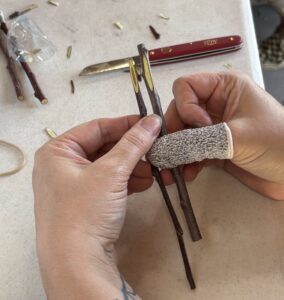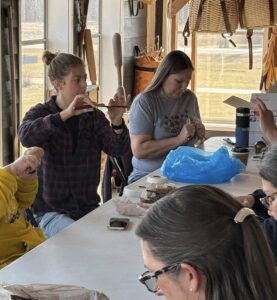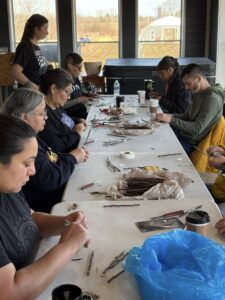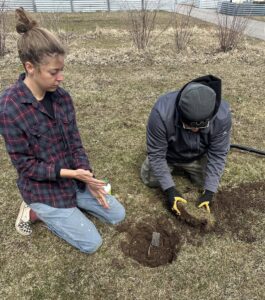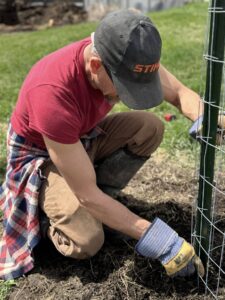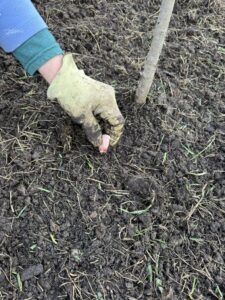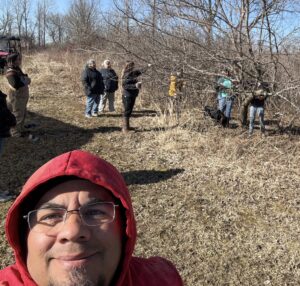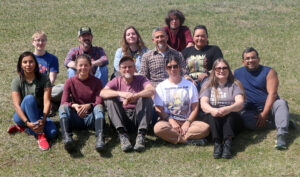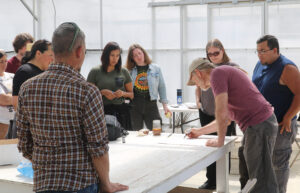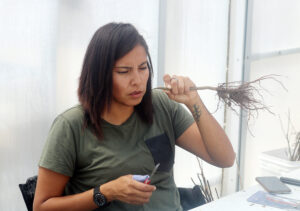Progress report for ONC23-123
Project Information
The Rematriation Partnership: Orchard Establishment and Care project, will allow Seed Savers Exchange (SSE) to educate and support three indigenous partner farms with establishing heritage apple orchards. While apples were not historically a source of food for Native Americans, apples were introduced after European emigration to North America and after the forced relocation of indigenous tribes and communities. The partner farms identified in this proposal are seeking to establish orchards on their properties, and Seed Savers Exchange has both the heritage scion wood of over 1,000 varieties of apples and the expertise to help farm partners graft varieties of their choice, plant, and prune and maintain new trees. After orchards are established years later and bare fruit, the farms will enjoy perennial food crops for generations to come and will be able to share the complex story of the connections with apples and their family history. Passing on the knowledge of how to graft apple trees will also empower the partner farms to continue to share their chosen apple varieties with others in a self-sustaining and self-sufficient manner. Partner farms are located in the upper midwest including the states of Wisconsin and Minnesota.
Objectives of the The Rematriation Partnership: Orchard Establishment and Care project include:
- support Indigenous agricultural sustainability, food access, and economic opportunity
- select apple varieties from the SSE collection to graft and plant at each of the three indigenous partner farms
- teach the skill of tree grafting and consult on establishing new orchards in each of the three indigenous partner farm locations
- educate indigenous farm partners on the long term care of heritage orchards
- educate networks of identified farm partners, SSE, other key audiences, and a broader segment of the public about the intersection of apples in Indigenous cultures
Cooperators
- (Educator)
- (Educator)
- (Educator)
Research
Educational & Outreach Activities
Participation Summary:
2025 Report:
This year, education and outreach activities expanded significantly with the addition of in-person consultations, on-farm demonstrations, tours, and a hands-on field day. Jamie Hanson, Orchard Manager at Seed Savers Exchange (SSE), served as the primary educational resource for farm partners, offering guidance through multiple formats: direct consultations, video resources, and on-farm support.
Throughout the year, Jamie provided ongoing support via email and phone to all three farm partners. She also provided pre-recorded instructional videos covering apple grafting, planting, disbudding, and orchard care. These tools ensured farm partners had access to technical advice even outside of scheduled events, building their confidence and skills in caring for young grafted trees.
On-Farm Consultations and Demonstrations:
Jamie conducted in-person visits to both Jennifer Falck and Dr. Rebecca Webster in Wisconsin.
Her first visit to Dr. Webster's farm included sourcing scion wood and consulting on best practices for scion storage in preparation for the spring grafting workshop. During a second visit—part of the workshop weekend—Jamie toured the farm, shared techniques for rodent protection and pruning, and provided hands-on planting guidance.
At Jennifer Falck’s nearby farm, Jamie offered a 1:1 evaluation of trees grafted in 2023. Together they reviewed successful versus unsuccessful grafts, assessed spacing and planting depth, and discussed strategies to improve outcomes in future plantings.
Grafting Workshop and Field Day:
A key educational event was hosted at Dr. Webster’s farm in April 2025. This workshop brought together all three Indigenous farm partners—Ukwakhwa Inc., Dream of Wild Health, and Kahulahele Farmstead—for a weekend of learning and collaboration. With materials and supplies provided by SSE, partners practiced grafting using both historic community scion wood and selections from SSE’s heritage apple collection.
One notable success was the propagation of a 200-year-old apple tree from a community member’s yard. With guidance from Jamie and SSE staff, farm partners harvested and stored scion wood, grafted it onto rootstock, and planted the young trees—strengthening both cultural and agricultural continuity.
2024 Report:
In the inaugural year of the project, the primary focus was on instructing partner farmers in the art of grafting apple trees and nurturing them in nursery care during their initial year of planting. Partner farmers convened at Seed Savers Exchange for an immersive, hands-on workshop where, under the mentorship of SSE staff, they personally grafted apple trees using scion wood sourced from our collection.
Subsequently, the grafted trees were transported back to the farms and carefully planted in nursery settings. Orchard manager Jamie Hanson provided virtual guidance on the proper care and maintenance of these newly established trees within an orchard environment. Looking ahead to the next phase of the project, Seed Savers Exchange intends to host another workshop to educate farm partners on the technique of pruning their maturing trees. However, we recognize the importance of allowing sufficient time for the trees to mature further before introducing this next skill.
Learning Outcomes
Improved Grafting Techniques:
Farmers gained hands-on experience in grafting apple trees, including selecting appropriate scion wood, proper grafting methods, and techniques for ensuring graft success.Understanding of Scion Wood Selection and Storage:
Partners learned how to identify viable scion wood, harvest it at the appropriate time, and store it safely prior to grafting—especially for culturally significant trees.Early-Stage Tree and Nursery Care:
Farm partners developed knowledge in planting depth, tree spacing, rodent protection, and disbudding practices essential for the survival of newly grafted trees.Recognition of Graft Success Indicators:
By comparing 2023 grafts with mixed outcomes, farmers learned to identify what contributed to successful versus unsuccessful grafts and adapted practices accordingly.Expanded Confidence in Orchard Management:
One farm partner reported that the mentoring received—particularly from Jamie Hanson—helped them feel confident in their ability to care for apple trees, setting the stage for long-term orchard stewardship.Strengthened Cultural Connection Through Agricultural Practice:
Partners reflected on the historical and cultural relevance of apples in their communities, especially the opportunity to propagate varieties tied to their ancestors and stories of relocation.Collaborative Learning Across Farms and Organizations:
The shared workshop setting created space for peer learning, mutual encouragement, and emerging collaborations that extend beyond this project.
Project Outcomes
2025 Update:
In 2024-2025, the Rematriation Partnership: Orchard Establishment and Care project deepened its impact by applying grafting and nursery skills learned in 2023 to preserve historically and culturally significant apple trees within Indigenous communities. A major milestone was the successful grafting of scion wood from a nearly 200-year-old apple tree with direct lineage to the Oneida Nation—originally planted from seed by Oneida people after their forced relocation to Wisconsin in the 1820s. With the tree now in decline, this act of propagation preserved not only rare genetic material, but also a living piece of cultural heritage.
Seed Savers Exchange (SSE) supported this work by visiting Ukwakhwa Farm to collect scion wood, teach proper storage techniques, and provide guidance in advance of the spring workshop. At the workshop, farm partners further developed their skills in grafting, pruning, and early-stage orchard care. They also received practical support in planning for permanent orchard placement, ensuring long-term integration into each farm’s landscape.
Personalized on-farm consultations by SSE orchard manager Jamie Hanson helped evaluate last year’s grafts, troubleshoot common issues, and tailor orchard plans to each site’s unique context. All participants were provided with the tools and supplies needed to continue grafting and pruning independently, building lasting confidence and capacity.
These efforts contribute to long-term agricultural sustainability in several ways:
- Economic: As the orchards mature, they will offer perennial harvests and future income-generating opportunities for the farms through apple sales or value-added products.
- Environmental: Perennial apple orchards reduce the need for annual tillage, fertilizers, and pesticides. Their deep root systems help mitigate erosion, increase biodiversity, and improve soil health and carbon sequestration.
- Social and Cultural: The project strengthens food sovereignty by reinforcing traditional knowledge and farming practices. It supports intergenerational learning and empowers Indigenous communities to steward and share culturally meaningful plant varieties for years to come.
Ultimately, this partnership promotes resilient, community-rooted agriculture while advancing the preservation of both biodiversity and cultural identity.
2024 Update:
Farmers from all three partner sites traveled to Seed Savers Exchange in April, 2023 from Wisconsin and Minnesota.
Partnering farmers included:
Dream of Wild Health (multi-tribal initiative), Jessika Greendeer, Seed Keeper and Farm Manager - lead (Washington County, MN)
Ukwakhwa, Oneida Reservation, Dr. Rebecca Webster, Oneida Farmer -lead (Outagamie County, WI)
Kahulahele Farmstead, Kayukwalote, Jennifer Falck, owner - lead (Outagamie County, WI)
Workshop attendees learned first hand from Seed Savers Exchange staff and advisors about how to reproduce apple trees by grafting scion wood onto rootstock, reproducing trees that are true to type.
All participants were supplied with tools needed, and practiced grafting trees themselves learning the new skill.
Farmers returned to their home farms, organizations, and communities with freshly grafted trees to plant. In the weeks to follow, SSE orchard manager Jamie Hanson worked with partners virtually to teach them how to plant the new tress and care for them during their first year in a nursery setting.
The hands-on learning approach and mentorship provided by Seed Savers Exchange is teaching partner farmers to learn the process of grafting trees and early nursery care. These skills can be used and enhanced with other grafting and orchard projects. Once the orchards are replanted in their permanent locations, the farms will reap the benefits of stewarding rare apple varieties, enjoying all the benefits of adding apple trees to the ecosystem of their farm, and providing future economic opportunity through the production of apples.
One powerful example of success emerged from a farm on the Oneida Reservation in northeastern Wisconsin. The farm worked with Seed Savers Exchange to preserve a 200-year-old apple tree grown from seed by Oneida people who were forcibly relocated to the region in the 1820s. With the historic tree in visible decline, a staff member from SSE traveled to the farm to help collect scion wood, teach proper storage techniques, and provide rootstock and grafting supplies. During a weekend workshop, the farm team grafted this precious wood onto new rootstock—bringing new life to an ancestral tree and ensuring its legacy would continue for future generations.
Reflecting on the experience, the farm shared that the grafting event “poured lots of love and good energy into these baby trees,” and credited the partnership with helping build their orchard confidence. They praised SSE’s hands-on approach, writing:
“We don’t want PowerPoint presentations or to participate in your studies where you extract our culture from us. If you want to help with food sovereignty efforts, bring the supplies and meet us in our communities for hands-on experiences.”
This highlights how the project supports cultural reconnection, technical skill-building, and long-term sustainability—creating meaningful, tangible benefits that extend beyond the orchard rows.
